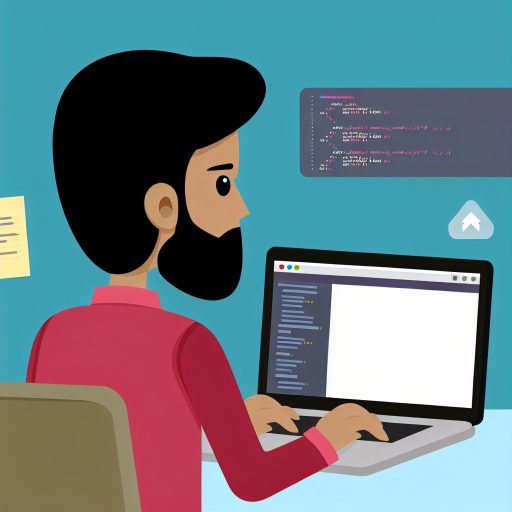Introduction to Free Coding Resources and Their Importance
Accessibility and Opportunity
Learning to code has become essential in today's technology-driven world.
Free coding resources provide easy access for learners everywhere.
Therefore, anyone can start coding without worrying about financial barriers.
These resources open doors to new career opportunities and skill development.
Variety of Learning Formats
Free resources come in many forms such as tutorials, videos, and interactive platforms.
This variety helps cater to different learning styles and preferences.
Additionally, learners can progress at their own pace using these tools.
Moreover, many platforms integrate real-world projects to build practical skills.
Community Support and Collaboration
Many free coding resources also provide access to vibrant communities.
Communities offer support, answers, and motivation to keep learners engaged.
Besides coding help, they encourage collaboration and networking with peers.
Consequently, learners gain valuable feedback and diverse perspectives on programming challenges.
Fostering Lifelong Learning and Adaptability
Free coding resources encourage continuous learning and skill enhancement.
Technology constantly evolves, requiring programmers to update their knowledge.
With freely available materials, staying current becomes manageable and cost-effective.
Tech Consulting Tailored to Your Coding Journey
Get expert guidance in coding with a personalized consultation. Receive unique, actionable insights delivered in 1-3 business days.
Get StartedHence, these resources foster a mindset of growth and adaptability among coders.
Top Websites Offering Free Interactive Coding Tutorials
LearnCode Academy
LearnCode Academy provides beginner-friendly interactive coding lessons.
Users can write code directly in their browser and see instant results.
The platform offers courses in Python, JavaScript, and Java.
Additionally, LearnCode Academy hosts regular coding challenges to sharpen skills.
Its community forums encourage collaboration and peer support.
CodeHorizon
CodeHorizon features hands-on tutorials with practical projects.
The website covers web development, data science, and app programming.
Its guided exercises help learners understand complex concepts step-by-step.
Moreover, CodeHorizon offers free certificates for course completion.
It supports learners with discussion boards moderated by expert mentors.
ByteCraft Learning
ByteCraft Learning emphasizes interactive coding through gamified lessons.
Students progress by solving coding puzzles and unlocking new levels.
The platform covers languages like C++, Ruby, and SQL.
Build Your Vision, Perfectly Tailored
Get a custom-built website or application that matches your vision and needs. Stand out from the crowd with a solution designed just for you—professional, scalable, and seamless.
Get StartedFurthermore, ByteCraft Learning integrates real-world examples in every tutorial.
They host weekly live coding sessions to answer learners’ questions.
CodeNest Community
CodeNest combines a learning platform with a vibrant coding community.
Free tutorials focus on JavaScript frameworks and backend development.
The platform offers pair programming options for collaborative learning.
Users can access community-driven project repositories and contribute code.
Extensive Q&A sections provide quick solutions to common coding problems.
DevTrail Interactive
DevTrail Interactive offers comprehensive interactive coding modules.
Its curriculum covers full-stack development and cloud computing basics.
The site features instant feedback systems to correct code errors promptly.
Moreover, DevTrail encourages learners with badges and achievement tracking.
It hosts forums where beginners can connect with experienced developers.
Best Free Video Platforms for Coding Lessons
YouTube Channels with Quality Coding Tutorials
YouTube offers a vast array of free coding lessons for all skill levels.
Channels like TechCraft Academy provide clear and concise programming tutorials.
Optimize Your Profile, Get Noticed
Make your resume and LinkedIn stand out to employers with a profile that highlights your technical skills and project experience. Elevate your career with a polished and professional presence.
Get NoticedCodeStream Central focuses on practical projects for beginners and intermediates.
Moreover, DevBytes shares quick tips and real-world coding challenges regularly.
Subscribers benefit from community interaction through comments and live streams.
Dedicated Online Learning Platforms with Video Content
FreeCodeCamp.org offers comprehensive video courses alongside its interactive coding curriculum.
They cover languages such as JavaScript, Python, and responsive web design.
The videos are created by experienced instructors like Maria Sanchez and Eric Thompson.
Similarly, Khan Academy provides beginner-friendly programming tutorials with step-by-step video guidance.
Its courses emphasize foundational computer science concepts and creative coding projects.
Interactive Coding Platforms Featuring Video Lessons
Codecademy provides free introductory courses with short videos explaining coding concepts.
The platform blends videos with hands-on exercises for better learning retention.
On the other hand, The Odin Project combines comprehensive video lessons with collaborative project work.
Instructors such as Liam Harris offer detailed walkthroughs of full-stack development topics.
These platforms encourage learners to practice coding while watching tutorials.
See Related Content: How Open Source Projects Double as Learning Resources
Free Coding Bootcamps and Structured Courses
Accessible Bootcamp Programs
Many free coding bootcamps offer immersive experiences.
They focus on project-based learning.
Lambda Learning Institute provides a thorough curriculum.
The curriculum centers on web development skills.
CodeCraft Academy delivers hands-on projects.
Industry experts guide their students through projects.
TechRise Bootcamp emphasizes practical coding challenges.
This approach reinforces student learning effectively.
These programs often include mentorship support.
They also provide career support to accelerate growth.
Online Platforms Offering Structured Courses
Structured courses help learners gain skills step-by-step.
This process also builds learner confidence.
CodeHarbor offers beginner-friendly modules.
The modules cover HTML, CSS, and JavaScript basics.
ByteForge University provides interactive lessons.
Students complete quizzes and coding exercises there.
DevNest Academy delivers comprehensive Python courses.
They also offer courses focused on data science topics.
These platforms typically give certificates upon completion.
Advantages of Formalized Learning Paths
Structured courses create a clear mastery roadmap.
This structure eases the learning of complex programming topics.
Courses break down concepts into manageable lessons.
Formal programs foster discipline with assignments and deadlines.
Students receive feedback to correct mistakes promptly.
Engagement with instructors encourages collaboration.
Peers also network and learn together in these programs.
Factors to Consider When Selecting a Program
Begin by defining your learning goals clearly.
Identify preferred programming languages to study.
Look for programs with flexible schedules.
This flexibility helps balance coding with other commitments.
Read reviews and testimonials to assess quality.
Explore courses that include real-world projects.
Building a portfolio strengthens career prospects.
Choose programs that provide community support.
Community engagement keeps learners motivated and connected.
Delve into the Subject: The Role of Cheat Sheets in Quickly Mastering Coding Syntax
Open Source Coding Communities and Forums for Learners
Benefits of Joining Open Source Communities
Open source communities provide an excellent environment for coding learners.
They allow you to collaborate on real-world projects and gain practical experience.
Furthermore, these communities help you learn from experienced developers worldwide.
Joining them accelerates your coding skills and improves problem-solving abilities.
Additionally, you build a network that can support your career growth.
Popular Coding Forums for Beginners
Stack Overflow is a top forum where you can ask and answer programming questions.
GitHub Discussions lets you engage directly with project maintainers and contributors.
Reddit’s r/learnprogramming community offers friendly advice and beginner tips.
Furthermore, Dev.to is a blogging platform where developers share helpful tutorials.
These forums foster active participation and continuous learning.
Active Open Source Projects Welcoming New Contributors
The Mozilla Firefox project encourages newcomers to contribute and learn.
Linux Kernel hosts multiple opportunities to work on system-level programming.
Additionally, the Django web framework community provides thorough mentorship for beginners.
OpenStreetMap invites anyone interested in mapping and data processing tasks.
By getting involved, you make meaningful contributions while sharpening your skills.
Strategies for Effective Engagement in Coding Communities
Start by reading community guidelines and existing discussions carefully.
Be respectful and polite when asking questions or offering help.
Try fixing small bugs to build confidence and gain trust.
Also, take part in code reviews to learn best practices and standards.
Consistent activity helps you grow and opens more learning opportunities.
Discover More: The Hidden Gems of Free Coding Resources You Didn’t Know You Needed
Free Coding Challenges and Practice Platforms
Interactive Coding Websites
Coding practice websites offer hands-on learning through real-world problems.
They help users apply concepts in an engaging environment.
For example, CodeSpring provides a variety of problems in multiple languages.
Also, ByteWave offers interactive tutorials alongside coding challenges.
These platforms give instant feedback to improve your skills efficiently.
Competitive Programming Platforms
Competitive programming sites foster problem-solving under time constraints.
They develop algorithms and optimize code effectively.
WebArena is a popular platform supporting contests by famous tech companies.
CodeTrove specializes in algorithm challenges suitable for all skill levels.
Joining these contests boosts coding proficiency and confidence.
Project-Based Practice Platforms
Some platforms focus on building projects to reinforce coding concepts.
CodeBuilders encourages users to complete small projects step-by-step.
InnovateCode offers tasks that simulate real developing environments.
Doing practical projects helps in understanding application development thoroughly.
It also enhances your portfolio for future job opportunities.
Community-Driven Practice Resources
Communities help by sharing problems, solutions, and advice openly.
CodingGuild provides daily challenges contributed by its members.
Similarly, DevCircle hosts peer-reviewed code exercises and discussions.
Getting active in such groups fosters motivation and diverse learning.
It also allows beginners to receive personalized guidance from experts.
Best Practices for Effective Coding Practice Sessions
Set clear goals before starting each practice session.
Break down complex problems into smaller, manageable parts.
Review and analyze your solutions to identify weaknesses.
Moreover, participate regularly to build consistency.
Finally, combine different platforms to cover a broad range of topics.
Discover More: The Ultimate Resource Kit: Where to Find the Best Free Tools for Learning Code

Resources for Learning Specific Programming Languages for Free
Python Learning Resources
Python remains one of the most popular programming languages worldwide.
You can start learning Python for free on CodeStream Academy.
It offers interactive tutorials and real-world projects to practice skills.
Additionally, the community forum allows learners to ask questions and share knowledge.
Another excellent option is OpenSourcePython.org, featuring video lectures and coding challenges.
JavaScript Learning Platforms
JavaScript empowers web development and interactive user experiences.
FreeCodeWave provides step-by-step JavaScript tutorials designed for beginners.
They combine videos with coding exercises for effective learning.
Moreover, JSInteractive hosts free workshops focusing on modern JavaScript frameworks.
Joining their Discord community helps you connect with other learners and mentors.
Java Programming Tutorials
Java serves as a backbone for many enterprise applications and Android apps.
CodePath Institute offers a free comprehensive Java course featuring hands-on projects.
They also provide mentorship opportunities for guided learning.
Furthermore, LearnJavaSite features concise explanations and sample codes.
Its active discussion boards foster collaboration among students worldwide.
Ruby Learning Opportunities
Ruby simplifies programming with elegant syntax and powerful libraries.
The RubyGarden platform offers free tutorials tailored for absolute beginners.
Besides, it includes challenges to apply learned concepts practically.
RailsCampus extends this foundation by teaching Ruby on Rails development.
It combines theory with real application-building exercises and peer support.
C++ Educational Resources
C++ remains essential for systems programming and game development.
CPPBasics website provides thorough lessons on core C++ concepts at no cost.
They offer quizzes to test comprehension after each module.
In addition, CodeMetal hosts code-along sessions to reinforce learning through practice.
Their active Slack group encourages knowledge exchange and troubleshooting.
Using Free Documentation and Official Guides Effectively
Choosing the Right Documentation
Start by identifying the official documentation for your target programming language.
Python developers often use the documentation from Python.org.
JavaScript learners rely on the Mozilla Developer Network (MDN).
Choosing official guides ensures access to accurate and up-to-date information.
These sources usually provide comprehensive coverage of language features.
Strategies for Efficient Reading
Begin by reading the introduction and setup sections carefully.
Next, focus on sections relevant to your current project or learning goals.
Use headings and the table of contents to navigate quickly through topics.
Keep notes or bookmarks to track important references.
Review code examples thoroughly to understand practical applications.
Combining Documentation with Tutorials
Complement documentation with free tutorials from platforms like FreeCodeCamp or Codecademy.
Tutorials provide structured learning and hands-on practice alongside theory.
Refer back to official guides to clarify concepts introduced in tutorials.
This combination deepens understanding and improves retention.
Practicing examples from both resources builds confidence.
Leveraging Communities for Support
Join programming forums such as Stack Overflow or Reddit’s r/learnprogramming.
Communities help answer questions on confusing documentation sections.
Interacting with peers motivates consistent progress and problem-solving.
Experienced developers often share insights or alternative learning tips.
Participate regularly to maximize the benefits of these collaborative spaces.
Establishing a Consistent Learning Routine
Set aside dedicated time daily or weekly for reading documentation carefully.
Consistency helps convert complex material into long-term knowledge.
Regularly revisit older sections to reinforce understanding.
Track your progress by summarizing what you have learned.
Apply the knowledge by coding small projects or exercises.
Tips on Combining Multiple Free Resources for Optimal Learning
Create a Structured Learning Plan
Start by setting clear and achievable coding goals.
Then, organize resources based on those specific goals.
For example, pair video tutorials with hands-on coding challenges.
This combination solidifies understanding and practical skills.
Additionally, allocate regular time slots for study sessions.
Consistency helps build momentum and retain knowledge.
Mix Different Learning Formats
Use a variety of materials such as interactive tutorials, videos, and articles.
Interactive platforms like CodecMatters provide immediate practice opportunities.
Meanwhile, video lectures from Genesis Code Academy clarify complex topics.
Augment these with blog posts and documentation for deeper insights.
Switching formats keeps learning engaging and reduces burnout.
Engage Actively with Coding Communities
Join forums like DevConnect or CodeGarden to ask questions and share progress.
Community input offers different perspectives and troubleshooting tips.
Participating in group projects enhances collaboration and real-world skills.
Moreover, feedback from peers motivates continuous improvement.
Make a habit of contributing regularly to foster relationships.
Leverage Project-Based Learning
Combine tutorials with personal projects to apply new concepts.
For instance, build a small website after completing HTML and CSS lessons.
Project work deepens understanding beyond theory.
Showcasing projects on platforms like GitHub attracts constructive critiques.
This cycle of learning and doing accelerates skill mastery.
Use Progress Tracking Tools
Track your learning progress with free apps like CodeTrack or LearnLog.
These tools help you visualize completed lessons and upcoming tasks.
Tracking progress keeps motivation high and prevents overwhelm.
Review your plan weekly and adjust resources as needed.
This adaptability ensures continuous growth and focus.
How to Stay Motivated and Engaged in Free Coding Programs
Setting Clear Goals
Define what you want to achieve before starting any coding program.
Break your learning goals into small, manageable tasks.
Focus on one objective at a time to avoid feeling overwhelmed.
Regularly review your progress to stay encouraged and on track.
Creating a Consistent Routine
Establish a daily or weekly schedule dedicated to coding practice.
Pick specific times when you feel most alert and productive.
Consistency helps build momentum and turns learning into a habit.
Try to eliminate distractions during your study hours for maximum focus.
Engaging with Coding Communities
Join online communities like DevCircle or CodeCrafters to connect with peers.
Participate in coding forums to ask questions and share ideas.
Engaging with others keeps your motivation high and provides support.
Collaborate on small projects together to practice your skills in real contexts.
Using a Variety of Learning Resources
Mix tutorials, videos, and interactive challenges to keep learning fresh.
Utilize platforms like FreeCodeIgnite and BitWave Academy for diverse content.
Changing formats prevents burnout and enhances comprehension.
Explore coding podcasts and blogs for new perspectives and tips.
Rewarding Your Progress
Celebrate small wins such as completing a module or solving a tough problem.
Set personal rewards like a break or a favorite treat to maintain enthusiasm.
Tracking achievements helps you realize how far you have come.
Positive reinforcement encourages you to keep learning and growing.
Additional Resources
Want to teach your kids to code? Here are three apps that can help …
113 Best Places to Learn to Code For Free | Coding for Beginners




